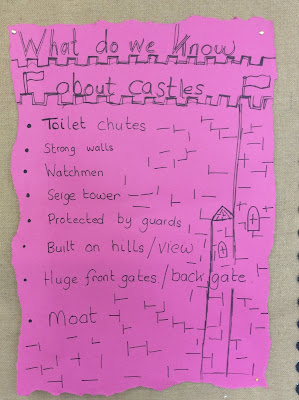Hello one and all, I hope you've had a great week. We certainly have in Squirrels class!
Much of our week has been spent in the Middle Ages. The year 1103 to be exact. On Monday we spent time researching the different roles of servants and how their working days might have been within a castle. We drew ourselves in Medieval clothing doing our jobs (marshals who tend the wagons and horses, maids, carpenters, messengers, gardeners, watchmen, candle makers and cooks) then stepped into our different roles within Queen Raven's castle.
The servants had a shock when Queen Raven herself came to inspect their work and made sure everything was done to the absolute highest standard! Afterwards, they completed some brilliant diary writing about their day.
On Wednesday, we were back in our story on the day of the siege. We used chalk drama squares on the playground to help us focus on our acting (mainly facial expressions and body language) before and during the attack. The servants were very loyal and faithful to Queen Raven and did their best to defend her in the castle, help her escape through the South Tunnel and then follow behind to join her in the safety of a nearby woodland.
On Thursday the servants met Queen Raven under the old oak tree at midnight. She told them to prepare to siege the castle themselves, as she wants her castle back and will take it by any means! The team stepped out of the story and back into 2021 to do some castle research. The afternoon was spent using books and iPads to discover everything there is to know about castles and how best to attack them. The general conclusion was "this is going to be a difficult challenge, but if we let Queen Raven down, she might execute us...", so we'll be working hard on Monday to form a solid plan!
SPAG
We had great fun on Monday learning about compound words. Compound words have two root words joined together to make a completely new word with a different meaning. E.g. butter + fly = butterfly. Rain + bow = rainbow. Star + fish = starfish. We had great fun thinking of as many as we could and applying them in sentences.
On Tuesday we recapped homophones. Homophones are words which have the same sound but two (or more) different spellings with different meanings. The tricky bit is knowing which word to use when. E.g. sea and see; to, too and two; hair and hare; knew and new; blue and blew.
Try spotting compound words and homophones when reading together and discuss the spellings together. You could also use pieces of paper or post it notes and make a 'Pairs' game to play together.
Maths
This week we have moved on to telling the time. This is a very tricky skill to learn, so please practise it as much as possible at home. If you are able to, please give your child an analogue watch to wear and encourage them to use it as much as possible. Talk about key times in the day together, such as when you wake up, leave for school, eat dinner and go to bed.
Year 2 have been focussing mainly on o'clock, half past, quarter past and quarter to times. More confident children have also been tackling telling the time to 5 minutes (5 past, 10 past, 20 past, 25 past, 25 to, 20 to, 10 to and 5 to).
Year 3 have done the same as Year 2 above, plus challenging themselves to read times to the nearest minute. They have also been learning about AM and PM and accurately writing digital times.
SPAG homework has been set on DoodleEnglish and maths time work has been set on DoodleMaths.
Have a great weekend Squirrels. Please remember to read every day and practise your spellings and maths facts little and often throughout the week and weekend!
From Miss Cartwright









No comments:
Post a Comment